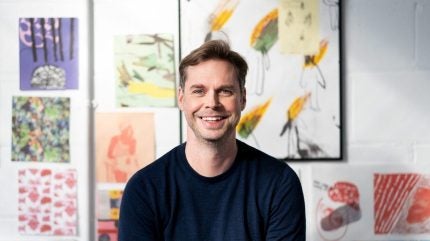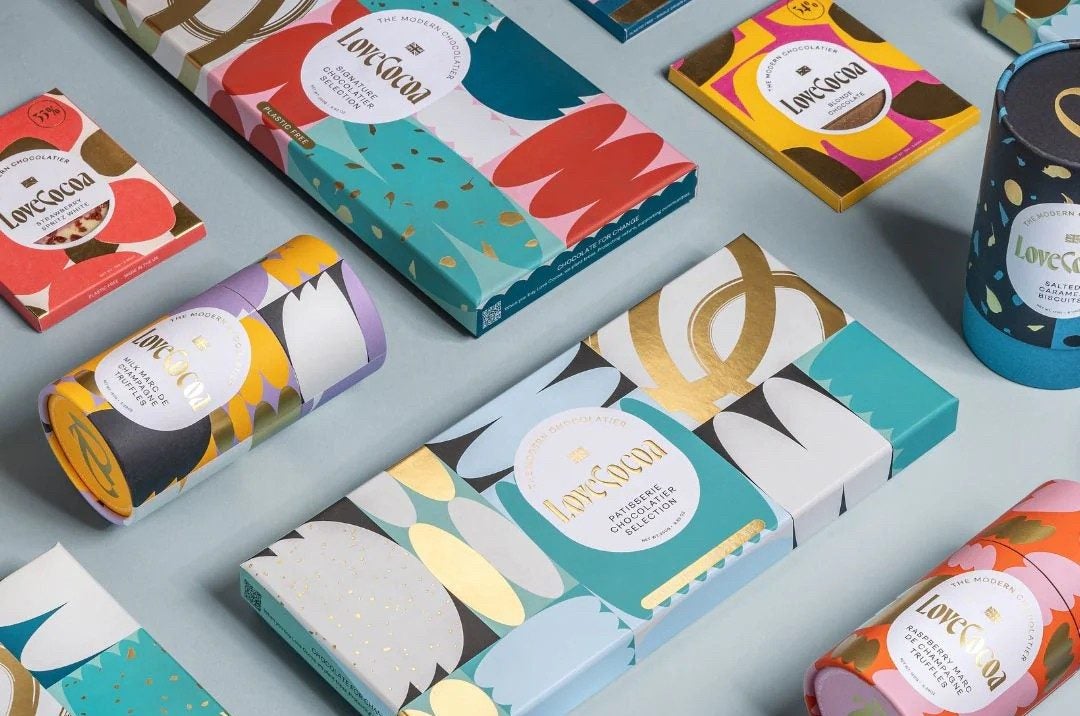
Made Uncommon has weathered the cocoa price storm by playing like the “big guys” in the futures market and has recently expanded with two acquisitions.
Operating out of Port Edgar Marina in Edinburgh, the chocolate business has recently changed its corporate identity from Coco Chocolatier to reflect the diversity of challenger brands in its portfolio, with ethically-sourced and child labour-free cocoa at the company’s core.

Discover B2B Marketing That Performs
Combine business intelligence and editorial excellence to reach engaged professionals across 36 leading media platforms.
The Coco and Up-Up brands, along with the Otherly plant-based chocolate line, have now been joined by Love Cocoa and Seed & Bean. Love Cocoa was previously run by James Cadbury, the great, great, great grandson of Cadbury pioneer John Cadbury, and includes another plant-based brand, B-Corp-certified H!p.
Calum Haggerty, Coco Chocolatier’s founder and now CEO of Made Uncommon, discusses the company’s plans and ESG credentials.
Simon Harvey (SH): What is the history behind Coco Chocolatier?
Calum Haggerty (CH): Coco Chocolatier was originally started in 2004 by an Australian woman in Edinburgh as two small retail stores. I bought that business in 2013 and changed it from a direct consumer retail brand to a wholesale business.
SH: What brought you to two M&A deals in quick succession?
CH: They appear quick but I’d been working on them for ages. It’s tough times in the chocolate industry with huge cocoa prices, although they’ve eased off somewhat.

US Tariffs are shifting - will you react or anticipate?
Don’t let policy changes catch you off guard. Stay proactive with real-time data and expert analysis.
By GlobalDataI was in the market to grow the business through acquisitions after spending a lot of the last 12 years building a factory, capacity and equipment. Coco Chocolatier also developed two other brands – Up-Up Chocolate and Otherly – but for quite a niche customer base. As we developed the ability to do more volume and scale, we needed to sweat those assets.
I know James Cadbury and heard on the grapevine that James was maybe looking to move on so I approached him and that was how we were able to structure that deal and get it over the line.
I’d also put the word on the street that we were open to looking at businesses and Seed & Bean approached me. That was an interesting one because we didn’t have an organic brand sitting in the Fairtrade space.
It’s hard to make money [as a small business] and when your raw material costs go up 70% overnight it’s even harder. I also didn’t realise in the early days that many start-ups outsource manufacturing. In hindsight, it’s the thing that’s allowed us to roll through tough times easier than others.
Now, we’re hoping to lower the price of Seed & Bean and regain some market share. In that space, it’s quite price competitive at the moment and Seed & Bean had slightly outpriced themselves in the market.
SH: Is manufacturing all in-house for all the brands now?
CH: There are certain things we don’t make in-house but the vast majority we do. For both Love Cocoa H!p and Seed & Bean there’s a pre-existing manufacturer for each. But our plan is to have all of that back in-house because that’s really when they start making sense for us commercially.

SH: What external funding has the business secured to finance M&A?
CH: Love Cocoa got a £4.3m ($5.6m) investment in 2023. Our holding company is Mothership Holdings, I’m the sole shareholder and sole director. We didn’t take any outside investment but we had to borrow money to do these deals.
SH: How have you managed to navigate cocoa prices?
CH: The course of the last 18 months has been the biggest challenge. Not just for me but for everyone in this business.
What’s absolutely critical in order for us to stay alive is you have to buy the same way as the big guys. If you’re buying through a UK distributor you’re toast. Those prices were going up by double-digit figures several times a year and it’s just not sustainable. A lot of people fell by the wayside that were slightly smaller than us.
We’re buying from Colombia. You need a bit of extra scale to buy on the futures market so in conjunction with our partner in Colombia we’ve taken a lot of positions in the futures market. We have a position for the whole of 2026 so we can now fix prices for our customers moving forward. You need a little bit of luck as well but I think being at least nine to 12 months in front of yourself is critical at the moment because whilst the market has cooled it’s still up 100%.
I think the days of very cheap chocolate are maybe over but I don’t necessarily think that’s a bad thing
Essentially, what happens in west Africa in the cocoa market affects the price everywhere, so although we don’t source from there that’s the powerhouse of the industry.
Clearly, there’s been a lot of under investment into the crop because the price has been historically low for so long. Farmgate prices have increased significantly in some of these countries, which I think is a good thing because I think for too long there’s not been enough money making its way down to the bottom end of the supply chain.
We’re a very small-bit player in this market and the big boys are the guys that move all these markets but you’d like to think some lessons have been taken. Whether that’s the case, we shall see. But I think the days of very cheap chocolate are maybe over but I don’t necessarily think that’s a bad thing.
SH: What ESG considerations do you have on board for sourcing cocoa?
CH: We have six different brands and each one has a slightly different way that it sources. What’s common with all of them is we don’t buy blended chocolate, that’s predominantly from west Africa, which has no traceability whatsoever and almost certainly has human rights abuses through it. The fact that can’t be proven isn’t a good enough standard for us.
The one that we really push into is with Up-Up. That’s a single-estate chocolate from one farm verified as child labour-free, which we believe to be pretty unique. We don’t know anyone else doing that.
We’ve shrunk the supply chain to as small as possible. It comes from one farm in Colombia and then from our partner that owns that farm. The people who work on the farm are employees, as opposed to smallholders. Essentially, we’re buying direct because we’re buying from one person that farms the cocoa.
We use a company called Impactt. They do unannounced audits on the farm and then check, for us, predominantly human rights stuff. Although people talk about forced labour, it’s quite a small problem everywhere. The biggest problem is child labour in the supply chain, certainly in west Africa.
SH: Where do you go from here and how did you come up with a name like Made Uncommon?
CH: Each one of the chocolate brands has its own slight nuance with regards to what channel it fits in – Seed & Bean is organic, H!p which is plant based, and Coco which is more conventional. The thing that pulls them all together is they all have their own unique, uncommon story that makes them all slightly different.
As challenger brands, everything we do must be a little bit different, otherwise, what’s the point to exist?
We’re wholesale manufacturers – 95% of our revenue is wholesale. When we present our brands, we present them under Made Uncommon to buyers, where they can see the whole portfolio and, depending on what kind of buyer they are, we hope they’ll lean into different things.
SH: What are the different listings?
CH: H!p was in Sainsbury’s, isn’t at the moment, but it is in Tesco and Boots. Up-Up is about to go into The Co-op. There are some major listings, along with bigger department stores and independents, which is where we cut our teeth. We do a lot of export stuff, 50% of our business is export.
The biggest market outside the UK is the US. Up-Up is in Fresh Market. We’ve got big customers in South Korea, Japan and Australia. For a smaller brand like us, sometimes it’s easier to find the right customer in a market than to try and do what traditionally big companies do, which is conquer a market, then go into another market. That requires huge investment and is beyond our means at the moment.
Sometimes it’s about finding the right supermarket, for example Poland, where we will launch Otherly in the next couple of weeks.
SH: Are you able to talk about growth rates and revenues?
CH: Our growth rate this year will be 100% as essentially we’ve doubled in size. We are still a small business. We currently have about 16 members of staff. That will grow pretty quickly up to about 25 over the course of the next three to four months.
SH: What are your ambitions? Have you got any targets in terms of turnover, or to make any further acquisitions, or just consolidate and build the business as it is?
CH: I think over the course of the next six months it’s definitely a period of consolidation. I would never say never on other opportunities. I think it would have to be right and there would have to be a reason to do it.
SH: How do you differentiate the brands amid all the competition?
CH: There are two aspects to that. One is how we source, which some people are interested in and some people aren’t. That’s the story that sits behind it.
It also comes back to the Colombia thing. When you’re pitching a business to, let’s say, the likes of Waitrose or Sainsbury’s or Tesco in the UK, yes they want to commercially succeed, but the question essentially they’re asking you is, ‘why should we take one of our brands off shelf to put you on, what’s unique about you?’
A lot of that is story driven or traceability driven. There’s that kind of first gate keeping where you have to be different in that way. And I would argue, if you’re not, then what’s the reason for you to exist? All challenger bands should have that anyway as that’s what grocery buyers are looking for. And then, once you get that opportunity, staying on shelf.
SH: Essentially, you’ve gone out and bought brands rather than companies?
CH: Seed & Bean we bought the IP. That’s essentially mostly the brand and the customer base that comes with that. For Love Cocoa, we bought the limited company, so the shares, all the assets and liabilities.





